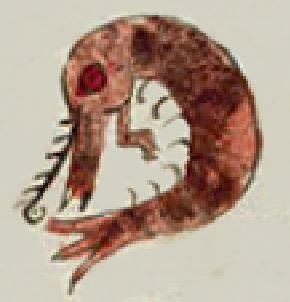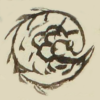chacalin (CST24)
This painting of the simplex glyph for the term chacalin (large shrimp) shows a profile view of a curving, pink or red shrimp. Seven little pleopods (swimmerets) appear inside the curving body. The head has an eye and an antennal flagellum with a spiral at the tip. Near the head is a large pieropod (leg). The abdomen is segmented.
Stephanie Wood
This shrimp glyph appears with a fish glyph, and both types of seafood were given to the local vicar and the altepetl community. The purchase cost 16 pesos, a considerable amount. This is a fairly detailed scientific depiction of the crustacean. Other glyphs supposedly showing chacalin appear below, but this one is much more accurate.
Stephanie Wood
1550–1564
Jeff Haskett-Wood

chacal(in), a large shrimp, https://nahuatl.wired-humanities.org/content/chacalin
camarón
Stephanie Wood
Códice Sierra-Texupan, plate 24, page dated 1559. Origin: Santa Catalina Texupan, Mixteca Alta, State of Oaxaca. Kevin Terraciano has published an outstanding study of this manuscript (Codex Sierra, 2021), and in his book he refers to alphabetic and “pictorial” writing, not hieroglyphic writing. We are still counting some of the imagery from this source as hieroglyphic writing, but we are also including examples of “iconography” where the images verge on European style illustrations or scenes showing activities. We have this iconography category so that such images can be fruitfully compared with hieroglyphs. Hieroglyphic writing was evolving as a result of the influence of European illustrations, and even alphabetic writing impacted it.
https://bidilaf.buap.mx/objeto.xql?id=48281&busqueda=Texupan&action=search
The Biblioteca Digital Lafragua of the Biblioteca Histórica José María Lafragua in Puebla, Mexico, publishes this Códice Sierra-Texupan, 1550–1564 (62pp., 30.7 x 21.8 cm.), referring to it as being in the “Public Domain.” This image is published here under a Creative Commons license, asking that you cite the Biblioteca Digital Lafragua and this Visual Lexicon of Aztec Hieroglyphs.



